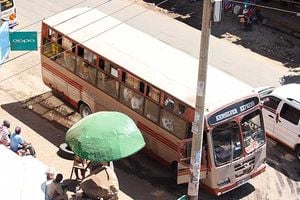MY STORY: I want to inspire more girls to science

Dr Esther Ngumbi is aware of the challenges young women face in the fields of science and tech. PHOTO| COURTESY
What you need to know:
- Dr Esther Ngumbi is aware of the challenges young women face in the fields of science and tech.
- And she’s doing something to change that.
In October 2015, www.cosmopolitan.com ran an article titled ‘This woman’s wedding registry will inspire you to be a better person’.
The woman was Dr Esther Ngumbi, from a village in Kwale County. And instead of the usual wedding gifts like kitchenware and furniture, she asked her guests to contribute towards the $15,000 (Ksh1.5 million) kitty she had established to build a science lab for a school in her community.
Today, Esther, 41, is an entomologist – a scientist who studies insects. She works as a researcher at the department of entomology and plant pathology at University of Illinois.
As a girl growing up on a farm in Mabafweni village, Esther was conflicted on which career to pursue. She toyed with the thought of becoming an accountant, but, “I did not have role models.
The closest I had was when we went to the banks in Mombasa with my parents. I remember seeing the bank accountants looking smart in their air-conditioned office. I would marvel and want to be like them, and sit in a beautiful office.”
Meanwhile, on the farm, she would witness predatory insects destroy farmers’ crops every so often. “When this happened, it meant food was going to be a problem,” she says. “I decided to pursue a career that would help farmers deal with the pests.”
Esther’s job involves finding ways to increase food security. “There is a lot of joy in the business of discovery; you never know what you’ll stumble upon and what the discovery might mean,” she says. “On a typical day, I get to the lab at 7am and inspect my insects and plants to see if they are happy and healthy. Then I carry out experiments. I also read a lot to keep up with changes in the field.”
In 2017, she received both the Emerging Leader and the Women of Courage Awards. This year, she received the 2018 SEB President’s medal, an award granted to young scientists of outstanding merit. She was among 18 individuals honoured by the Clinton Global University Initiative. She has also been inducted to the US National academy of Inventors. Additionally, she is listed on One World’s compilation of 100 Unseen Powerful Women who Change the World.
BOYS VALUED MORE THAN GIRLS
In Esther’s community, boys are valued more than girls – so much so that she was the first woman from her village to earn a PhD. “It took the encouragement of my father who believed in gender equality,” she says.
In America, not only is she among a small clutch of women in science, but she also found that there are even fewer women of colour in science.
“This constantly reminds me why I need to inspire more young women to pursue science,” she says. “I have also attended high-level meetings where I’m the only (black) woman. I find that I am judged differently or challenged to higher standards because, as a black person, it is always assumed we are lazy or can’t deliver. Being a woman of colour necessitates that you step up your game. But this has ended up working in my favour. I have learned to always go an extra step, and to be persistent and bold.”
One of Esther’s biggest passions, she says, is The Dr Ndumi Faulu Academy, a school that she and her parents founded to get more young girls into science. And it is for this school that she was raising the science lab funds.
“I don’t want to be the only PHD in my village,” she laughs, “but I am happy with the small changes we’ve made. I remember in 2010 when we decided to start the school, the compound was empty and we only had a one dilapidated house. Today, it is a full-fledged school with almost 100 students. We have a library and greenhouses.”
She adds that her big dream is to grow the school into Africa’s Harvard and also to be a full-time researcher in it. As for the fulfillment of her childhood dream to help farmers in her community, she is currently running a start-up called Oyeseka Greens which supports farmers at the Coast. What is the one career move that has helped her along the way?
“I have honestly let passion lead the way,’ she says. “I also learned about the power of networking. Those networks have opened many doors, including the White House one. I have learned to use every opportunity in my path and not take any things for granted. I have also learned to be humble!”





